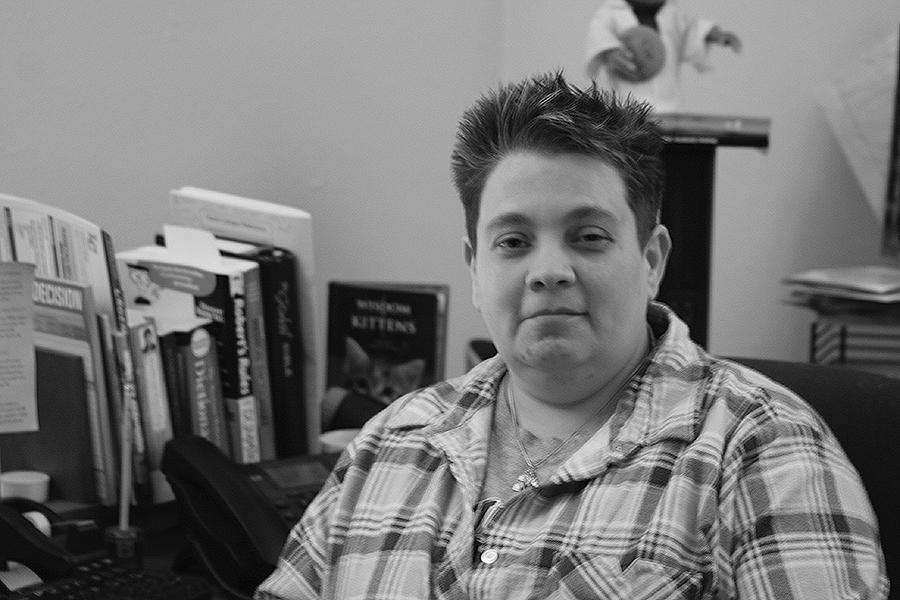Kelly Quick serves as an autism advocate
April 24, 2014
According to Centers for Disease Control and Prevention, “about 1 in 68 American children has been identified with autism spectrum disorder (ASD).” The children will someday become adults with autism; Kelly Quick, assistant professor of exercise science, is a living example.
Quick’s older brother, Corey, works at an alternative school, and after recognizing the symptoms of autism in his sister, he suggested that she get tested. Quick was diagnosed with Asperger’s disorder in December 2012.
“I see the diagnosis as a mixed blessing,” Quick said. “I look back on things that happened as a kid, and it makes sense now. For example, if you read the list of what children with autism do, it says they don’t have peer group friends, but they always speak like the little professor. In third grade, I was called the ‘40-year-old midget.’ To me, adults were more interesting than playing with my peers.”
The American Psychiatric Association’s Diagnostic and Statistical Manual of Mental Disorders (DSM-IV) classifies autism and Asperger’s disorder under the umbrella diagnosis of autism spectrum disorder. According to the Autism Society, Asperger’s has less severe symptoms and fewer language delays than autism.
“I was nonverbal for the first couple years of my life, and mom just thought I was a quiet baby. I did a lot of rocking…until six years old,” Quick said. “[The typical behaviors of autism] were usually stress-related. We moved from Illinois to Wisconsin when I was 10 years old, and I developed a habit of pulling out my hair.”
Individuals with autism have varying levels of verbal ability—from no difficulty to being completely mute. Additionally, they tend to engage in what is called ‘self-stimulatory behavior,’ which includes the repetitive actions of rocking, pulling out hair, flapping one’s limbs, stomping/tapping feet, making vocal sounds, scratching one’s body and even blinking.
“I try not to [self-stimulate] because I understand what it is, so I have fidget toys [such as pliable rubber noodles],” Quick said.
As clearly exhibited by the stress Quick underwent after her childhood move to Wisconsin, individuals on the spectrum tend to have compulsive personalities and enjoy familiarity. To this day, Quick cannot reach her full teaching potential unless the classroom is arranged a certain way, and students are supportive in helping her reorganize if a prior class moves items around. She tends to mentally dwell on negative incidents that take place throughout her day, but she finds that journaling positive experiences helps to curb her thoughts.
Quick details how some people examine her symptoms and feel that autism is not that bad because they engage in a few of the behaviors themselves, such as obsessing over a negative experience.
“Autistic people don’t do things that you don’t do; they just do them at varying extremes,” Quick explains.
The most taxing symptom for Quick has perhaps been her difficulty in following social rules. Like many individuals with Asperger’s disorder, she views the world in an extremely logical way, but people often misinterpret her personality as being callous.
For example, while Quick was working at a movie theater, she was notified that her mother was in a car accident and hospitalized. There was realistically nothing she could do for her mother, so Quick desired to finish her shift. The manager was stunned.
As a result of incidents like that, Quick finds herself working out and trying to abide by social rules.
“You have to learn who you can be yourself around and who you can’t,” Quick said. “The self-censorship is draining…[people] don’t understand it.”
The autism advocate has two main tips for those who have never encountered the disorder before.
“Firstly, don’t take our [logical approach to things] personally. Secondly, I wish people would focus on our strengths, like [our concentration], as opposed to dwelling on things like ‘your facial expression was off,’” Quick says. “Don’t focus on our weaknesses. It’s no different than anyone should be treated—always focus on their positives.”


